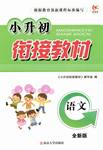题目内容
用方框中所给单词的适当形式填空,使短文通顺、正确、连贯(每个单词限用一次)。
|
My grandfather is seventy years old, 【小题1】 he is still very healthy. He is tall and of medium 【小题2】. He has short straight white 【小题3】. He likes reading. Every morning he 【小题4】 up very early and then reads morning 【小题5】. When he reads, he always wears 【小题6】. He also likes 【小题7】 chess, too. He always plays chess with his 【小题8】 friends. He 【小题9】 plays chess with me. Why? Because I 【小题10】 play chess.
【小题1】but
【小题2】build
【小题3】hair
【小题4】gets
【小题5】newspapers
【小题6】glasses
【小题7】playing
【小题8】old
【小题9】never
【小题10】can’t
解析试题分析:这篇文章讲述了作者的爷爷70岁了,但是仍然非常健康,他早上总是起的很早,然后读报纸。他还喜欢下象棋。
【小题1】根据句意:作者的爷爷70岁了,但是他仍然非常健康。but但是
【小题2】根据句意:他中等身材。build体格
【小题3】根据句意:他有着一头白色的短直发。hair头发
【小题4】根据句意:他每天早上都起的非常早。gets up起床,单三形式
【小题5】根据句意:然后读晨报。newspapers报纸
【小题6】根据句意:他总是要带着眼镜。glasses眼镜
【小题7】根据句意:他也喜欢下象棋。playing玩耍 like doing 喜欢做某事
【小题8】根据句意:他总是和他的老朋友下象棋。old老的
【小题9】根据句意:他从来不和作者下象棋。never从不
【小题10】根据句意:因为作者不会下象棋。can’t不会
考点:词汇
点评:本题不难,全在于平时基础知识的掌握情况。对于平时的学习要多积累,答题时结合句意和语法进行分析,答完后通读,是否通顺,符合逻辑。

练习册系列答案
 学而优衔接教材南京大学出版社系列答案
学而优衔接教材南京大学出版社系列答案 小学课堂作业系列答案
小学课堂作业系列答案
相关题目
| 任务型完形填空:用方框中所给单词的适当形式填空,每个单词限用一次,使短文通顺正确连贯,将答案填写在题后的横线上。 | |
Life used to be fun for "teenagers". They used to have money to spend, and free time to while away (消磨). They used to wear teenage clothes, and meet in teenage coffee bars and discos. Some of them still do. But for many young people, life is harder now. 1. are difficult to find. There's not so much money around. Things are 2. , and it's hard to find a place to live in. Teachers say that students work harder than they used to. They are less 3. in politics, and more interested in 4. exams. They know that good exam results may bring them better jobs. Most young people worry more about money than their parents did twenty years ago. They try 5. less and save more. They want to be able to get homes of their own one day. For some, the answer to unemployment (失业) is to leave home and look for jobs in one of Britain's big 6. . Every day hundreds of young people arrive in London from other parts of Britain, looking for jobs. Some find jobs and stay. 7. don't, and go home again, or join the unemployed (失业者) in London. When you read the newspapers and watch the news on television, it's 8. to get the idea that British young people are all unemployed, angry and in trouble. But that's not true. Three quarters of them do more or less what their parents did. They do their best at school, find some kinds of jobs in the end, and get 9. in their early twenties. They get on well with their parents, and enjoy their family life. After all, if they don't, they 10. be British, will they? |
| 任务型完形填空:用方框中所给单词的适当形式填空,每个单词限用一次,使短文通顺正确连贯,将答案填写在题后的横线上。 | |
3._______ music instruments (乐器). Many 4._______ of music have developed. There are so many kinds of music and you may be 5._______ in some of them. Music has different 6._______ for everyone. It is 7._______ by the old and young, men and women. It can make people happy or sad. In our 8._______ world, radios and televisions offer us lots of music, giving us enjoyment, 9._______ in a music lesson or at a concert. Music means different things to different people. Music 10._______ to the whole world. |